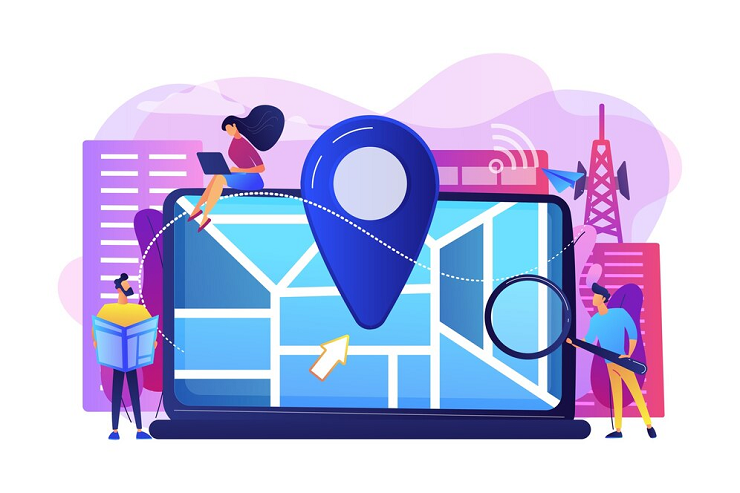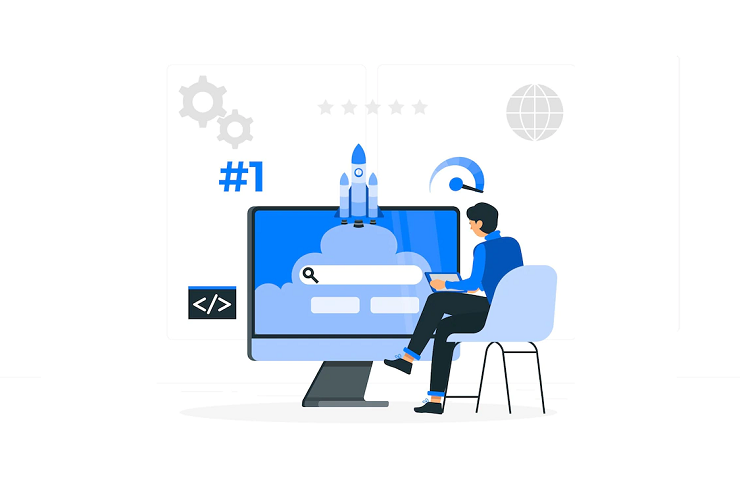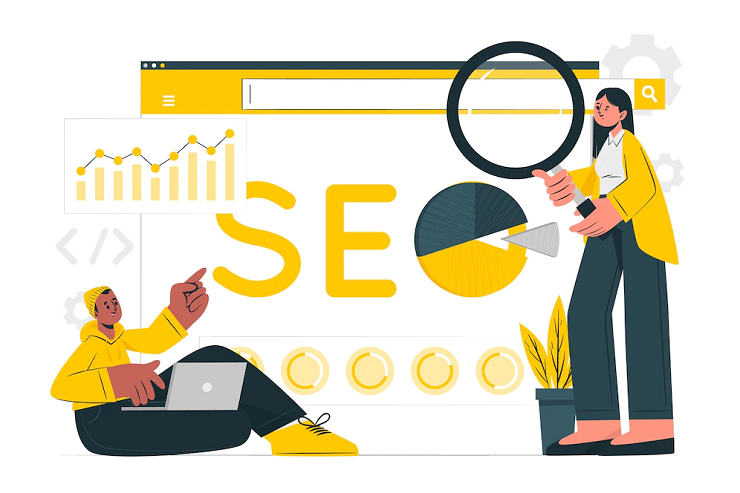
Local SEO (Search Engine Optimization) is the technique of increasing search engine presence for small companies with physical locations. Businesses may increase organic traffic from customer queries in nearby areas by following local SEO best practices. To gather information for local search, search engines rely on signals such as local content, social profile pages, links, and citations to offer the most relevant local results to the user. Businesses may use local SEO to get in front of local prospects and consumers who are seeking their goods and services.
How Does Local SEO Operate? What Is It?
Local SEO is a marketing strategy that assists local businesses in increasing their presence in Google’s local search results. Businesses that want to be more accessible to local customers online engage in it. If you want to sell products or services to consumers in a certain town or city, you need to understand local search marketing. To execute SEO for a local firm, you will carry out a sequence of measures aimed at increasing local search exposure. Among the best practices are:
- Control and enhance your Google Business Profile (formerly Google My Business)
- Management of one’s reputation
- Website enhancement
- Creating citations
- Changing Google search results
- Creating local links
- Spam fighting
When done correctly, this sort of SEO may help a local business appear more prominently in the Local Pack, Local Finder, localized organic results, and Google Maps.

Why Is Local SEO Essential?
As a business owner, you may believe there is no use in investing time and money to enhance your Google presence when you’re competing for top ranks with Walmart and Amazon. That may be true for the major organic listings, but it is not true for local searches. Local SEO helps you to engage with individuals in your neighborhood, town, or city, whether you have a real brick-and-mortar business or service a specific geographical area. That’s important given that 81% of consumers now turn to Google to evaluate local businesses.
Let us see a few pointers to know why local SEO is essential:
1. Increased Foot Traffic In Store
Increased local visibility can help drive more foot traffic to your physical business, whether it’s a café, dry cleaning, or hardware shop. If you’ve spent a lot of money on specialized equipment, created an inventive environment, or have a physical presence because your items are better experienced in person, increasing the number of people who stop by can help you build a buzz about your place and earn more sales.
2. Increased Online Visibility
Many local SEO efforts will not only help you boost your visibility in local search results but will also help you improve your entire online exposure. Citation building, for example, is an important aspect of local SEO. This entails increasing the number of times your company’s name, physical address (preferably with zip code), and phone number appear in directories, social media accounts, and online review systems.
Because you’ll be doing this in as many various locations as possible, it will be simpler for your company to be discovered by the appropriate people (those interested in your specific product or service in their local region) at the right moment (when they’re actively looking for a company like yours).
3. Targeted Internet Traffic
Every minute you spend dealing with unqualified leads or customers who are unlikely to make a purchase or book service is money lost as a small business. Local SEO may assist screen out irrelevant traffic and eliminate time drains that keep your business running smoothly, ensuring that your firm is only accessible to search users in your local region.
With 59% of search users using Google to research an in-store purchase, this may be a big benefit because it allows you to focus your resources on those consumers who are most likely to convert.

4. More Maps Users Calls And Visits
Improving your Google Business Profile might result in increased exposure on Google Maps. Because Google Maps was expressly created to assist users to identify local services and plan their routes, this can lead to increased calls and in-person visits. Because Google Maps is supplied with information derived from Business Profiles, any Google Business Profile improvement you perform will immediately benefit your Maps exposure, boosting the number of calls and in-person visits.
5. Increased Sales
When selecting a local business, consumers utilize internet reviews to aid in their decision-making process. One in every eight persons searches the internet for information 3about a local company more than once a week. Being able to offer them genuine recommendations from their peers for your organization as a consequence of your reputation management work is a great benefit that emphasizes the importance of local SEO.

6. Your Business Becomes More Competitive
Benchmarking rivals and analyzing what they do better than you is a crucial component of establishing and improving your local SEO strategy. Identifying these areas for improvement (and being able to put what they’ve learned into practice without the trial-and-error process that may have been required to arrive at a successful plan) puts your company on a much more competitive footing.
Studying their reviews, for example, could tell you what customers appreciate about their service so you can incorporate a similar approach within your business.
7. Increased Trust Levels
It’s no secret that reviews are an important aspect of local SEO performance and ranking. The more reviews you receive as part of your reputation management plan, the higher your visibility in local search.
Reviews are also necessary for establishing consumer trust, which is a prerequisite for every commercial transaction. According to research, more people than ever before are reading online evaluations regularly, with half saying they trust online reviews as much as personal recommendations. Greater visibility combined with top-rated, new reviews is a winning combination for both local pack prominence and better levels of customer confidence.
How Does The Local Search Algorithm Work?
Ranking in local search is becoming increasingly challenging because of the Competition. The Google local algorithm is regularly updated to ensure that search results are as close to the intent of a user’s query as possible. As SEO professionals and digital marketers, we must be aware of these developments and be prepared to pivot or adjust our plans as needed. We might lose our local search presence in the blink of an eye if we don’t.
The three primary ranking pillars help you understand the local search algorithm, so you, like me, can stay ahead of the competition and know what to watch out for. Relevance, Proximity, and Prominence are the three primary ranking foundations that we shall explore. Understanding each major pillar can help you succeed in local search and beat Google’s local algorithm.
1. Relevance
The relevance of a local Business profile relates to how well it fits what someone is looking for. Because Google’s algorithm determines what works best for the consumer based on what they’ve typed into the search engine, a restaurant located a long distance away may appear first and rank as a higher alternative due to its relevancy.
For example, if you had a pizza restaurant in Texas, you’d want Google to associate your establishment with terms like “pizza Texas.”
2. Proximity
Proximity takes into account how distant each potential search result is from the location phrase entered into the search. If a user does not indicate a location in their search, Google determines the distance based on what they know about the searcher’s location.

3. Prominence
The prominence of a company relates to how well-known it is. Some locations are more prominent than others in the offline world, and search results attempt to reflect this in local ranking. Furthermore, the number of evaluations and views on a profile impacts the business’s popularity.
What Are The Different Local Search Types?
A user may execute a local search in three ways: non-geo-modified, geo-modified, and “near me.” You should constantly think about optimizing for the many ways consumers search. Consider the distinction:
1. Non-Geo-Modified
This search activity is indicative of a user seeking something nearby. For example, I’m in Las Vegas and do a local search for “pubs.” The pubs nearest to me will most likely appear in the local search results. This is because search engines are leaning more heavily on proximity (not to suggest that popularity and relevancy aren’t important).
2. Geo-Modified
Although this isn’t always the case, individuals often conduct local searches when they want to go somewhere or are visiting a new city. For example, if I’m looking for a pub in a nearby city in Las Vegas, my search query may be “Pubs in Winchester.”
These results will differ from those obtained if I searched for “pubs” while physically present in Winchester. If geo-modified searches identify that you are not in the city you specified, they will prioritize relevance and prominence over proximity. Search results will frequently include postings near the city center with high relevance and prominence.
3. Near Me
“Near me” searches were quite popular a few years ago. These are searches in which a user enters a query such as “pubs near me.” Fast forward to 2018, and we notice that this tendency is fading. As “near me” is now inferred when performing a local search. When they search, users want to get the most relevant results “near them.” Nonetheless, it is a variety that some users still look for.

Few Local SEO Tips To Follow:
1. Optimize Your Website For Google My Business
Google My Business has emerged as the pinnacle of local search. Google My Firm is an outstanding tool for helping your business satisfy Google’s demands because Google willingly supports, validates, and shares its material.
To make sure you’re ready for Google My Business, you should do the following:
- Make a Google My Business page and validate it.
- Within your account, use Google Posts.
- Encourage your consumers to leave online reviews.
- Respond to reviews truthfully, including your location. “For example, we appreciate your feedback on [product/service] in [city, state].” We appreciate your input and hope to work with you again in the future.
- If Google can authenticate your business, the search engine may reward you with a coveted sidebar spot in Google’s local search.
2. Participate In Social Media And Upload Posts To Google My Business
Google views social media material to be more essential than ever before. Now that you’ve created a stunning Google My Business page, share it on social media to better integrate social and search.
3. Verify That The Spellings Of Your Name, Address, And Phone Number Are The Same On All Platforms
You must make it simple for people and search engines to locate you, and you must do it by establishing your NAP. The abbreviation NAP stands for a company’s name, address, and phone number (with area code). For Google to display it better in location-based search results, your NAP should be deemed crawlable HTML content on your site. The header or footer of a website usually contains the NAP. Additionally, your NAP should be included on a “Contact Us” page.

4. Improve Your Internet Directories And Citations
These four map data aggregators supply much map data for Apple, Yelp, Bing, Google, Trip Advisor, and other firms in the United States:
- Foursquare
- Express Update
- Neustar Localeze
- Factual
Check to make sure your citations are uniform and comprehensive across these four data aggregators. Misspellings, abbreviations, a lack of a suite number, or erroneous phone numbers can all be troublesome. If Google cannot decide which information about your company is correct, it may not display your company in search results at all.
5. Conduct A Local SEO Audit
It may be tempting to put your foot on the brake once you’ve mastered the fundamentals. In contrast, SEO is a continual and intuitive process. Instead of stopping there or simply making changes and seeing what sticks, it’s a good idea to do a thorough audit to assess where your website stands and what you need to work on to meet your objectives.
The following items may be included in a local SEO audit:
- Google My Business Audit – How does your Google My Business look in the search engine results pages? Is the information correct?
- According to Google Search Console, is your site crawlable? Is it free of faults that would make indexing difficult?
- On-Page SEO Audit – Does your website include all of the on-page SEO aspects that aid in the ranking?
- Citation Audit – Are all of your citations in the leading business directories correct?
- Competitor Analysis – How does your site compare to the competition? Are there any holes that need to be filled? In terms of inbound links, content, design, and placement, how do you compare?
- Website Audit – How effective is your website?
6. Improve The Structure Of Your Internal Links
Although external links to your site are desirable (as I’ll describe shortly), altering your internal linking structure will also improve your SEO results. Internal linking is important because:
- Helps with website navigation
- Assists with website hierarchy and information architecture.
- Page authority and ranking power are distributed among pages.
7. Improve Your URL, Title Tags, Headers, Meta Description, And Content
When it comes to content, each new blog post represents a new indexed page for your site, a new page to target a geographic search term, and a new chance to be found in search engine results pages (SERPs). Every time you create new material, you should optimize it for search engines by incorporating high-volume keywords into the URL, title, header, meta description, and body. If you’re stuck on geo-targeted content ideas, consider emphasizing customer success stories and case studies.

8. Include Location Pages On Your Website
Create location pages if you have more than one physical location. Readers may find your name, address, phone number, business hours, unique store descriptions, parking/transit information, specials, and customer feedback on location pages. You should also avoid duplicating material across numerous location pages. Create a geographically detailed About Us page for single-location enterprises. You may gain additional points if you include a Google Map on your website’s location page.
9. Produce Local Content
Google is becoming smarter, which implies that content providers may now write more for people and less for search engines. While blogging about wide issues can draw a large audience, it is often more vital to narrow your emphasis and write about local or industry news to attract a local audience. Promote local industry meetings, news, employees, and other informative information on your blog to become the local expert for your sector. Consider top-of-funnel content that goes beyond what your company offers.
10. Check That Your Website Is Mobile-Friendly
Local and mobile searches are inextricably linked (61% of all Google searches are conducted on mobile). People will use your site in a mobile context to seek reviews, locate directions to your location, and search for contact information, among other things. Mobile “near me” searches have surged 250% since 2017. Make your website mobile-friendly for your prospects and clients.
11. Obtain Relevant And Authoritative Inbound Links
Inbound links are enticing possibilities to promote your local SEO – each inbound link informs Google that you are a reputable business, and inbound links may help increase your domain authority. Here are a few methods for obtaining inbound links:
- Partnerships or Sponsorships
- Scholarships
- Guest Blog Posting
Begin by reaching out to your network, which may include the Chamber of Commerce, business development districts, licensing bureaus, trade groups, resellers, vendors, manufacturers, and other affiliates. Consider sponsoring a webinar or meet-up, hosting a community event, promoting something local you care about, and cultivating relationships with influential individuals. Additionally, have the confidence to approach partners and ask them to include you in their partner directory.
Being a guest blogger might also help you gain links. Positively interact with or about others in your field, and serve as a resource to the community. If you’re an active participant in community dialogues, you’ll notice an increase in inbound links, social media growth, and media attention.

12. Participate In Your Neighborhood
The more you become involved in your community, the more digital PR you’ll get. Having a volunteer day at your company, sponsoring an event, or appearing in the local media as an authority in your sector are all methods to garner press, brand recognition, and inbound links.
Wrapping Up
Local SEO is an essential component of any SEO plan for small companies. Local SEO will help your audience find you when they search online if you have a shop or a service region. We hope you find this valuable information in your quest for online brand recognition and authority.
